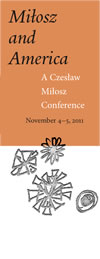
Yale joined the worldwide Polish celebration of the centenary of the birth of the Nobel-prize-winning poet, novelist, and diplomat Czesław Miłosz (1911-2004) with a series of events. On Nov. 4-5, the European Studies Council and the Beinecke Rare Book and Manuscript Library, home to Miłosz’s archives, cosponsored a conference on Miłosz and America, which brought together renowned poets, scholars, and translators to consider Miłosz’s role in bridging Polish and American literary and cultural traditions. To complement the conference, the Beinecke is hosting a major exhibition of its archival materials titled, Exile as Destiny: Czesław Miłosz and America through Dec. 17. “An Evening with Miłosz & American Poets” was held on Nov. 10, in which American poets – Anna Frajlich (Columbia), Benjamin Paloff (University of Michigan), and Alissa Valles – discussed their contacts with Miłosz, reading from his and their own works.
Miłosz spent the first half of his life in Poland, then about ten years in France, and the rest of his life in the U.S. His life spanned a time of political upheaval and social turmoil. He lived in Nazi-occupied Warsaw, in the Paris of exiled literati, and in the Berkeley Hills. The scope of Miłosz’s thought covers the whole of the twentieth century, and his works explore the most central questions of Western modernity, including the cultural and political intersections between Europe and America. His teaching at Berkeley, his friendships, and personal involvement in the issues of the day made him one of the central figures in American intellectual life. The Nobel Prize he received in 1980 honored his achievement both as a Polish and an American writer.
The conference consisted of film screenings, panels, presentations, and poetry readings. Among the participants and contributors were the Polish Cultural Institute-New York and the Polish Institute of the Book. Poets Tomas Venclova and Adam Zagajewski reflected on Miłosz’s work in light of their own acquaintance with the poet himself. Andrzej Franaszek, author of a monumental biography of Miłosz recently published in Poland, presented some conclusions drawn from his comprehensive survey of the poet’s life. Scholars from Poland and the U.S., many of whom knew Miłosz, including Bogdana Carpenter (University of Michigan), Krysztof Czyzewski (Borderlands Foundation), Irena Grudzinska Gross (Princeton), Jerzy Jarzebski (Jagiellonian University), Marek Zaleski (Institute for Literary Research, Polish Academy of Sciences), Mark Danner (University of California at Berkeley), and others considered Miłosz’s intellectual legacy as the author of the penetrating critique of the accommodations that intellectuals make to survive under totalitarianism, The Captive Mind, as well as his reflections on topics ranging from history and politics to literature and theology.
Miłosz’s manuscripts, documents, and photographs on display at the Beinecke reveal lesser-known aspects of Miłosz’s multifaceted relationship with America, with his adopted home in California, with fellow émigré authors, and with the English language.
These events were held with Title VI National Resource Center funds from the U.S. Department of Education.
